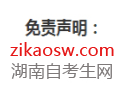以下是湖南自考生网为考生们整理的“2010年4月自考00096外刊经贸知识选读真题及答案”,考生可通过自考历年真题练习更有把握的面对考试,对题型更加熟悉,从而取得更佳的成绩。供考生参考。
2010年4月高等教育自学考试
外刊经贸知识选读试题
课程代码:00096
一、Choose one answer that best explains the underlined part of the following sentences. (本大题共15小题,每小题2分,共30分)
在每小题列出的四个备选项中只有一个是符合题目要求的,请将其代码填写在答题纸相应的位置上。错选、多选或未选均无分。
1. Owing to the financial crisis, economic problems were exacerbated all over the world.
A. deteriorated
B. improved
C. enlarged
D. transformed
2. The authorities are willing to permit a run-down in the country’s international reserves over the next few years.
A. run away
B. reduction
C. enhancement
D. downward
3. Figures show that the bulk of our foreign obligations consist of non-bank trade-related credits.
A. investments
B. profits
C. revenues
D. debts
4. Foreign investors want to enjoy the same tax status as the domestic ones.
A. treatment
B. decline
C. support
D. objection
5. More than a decade of fast growth makes China to supplant Japan as West’s main trade worry in Asia.
A. exceed
B. replace
C. agree
D. defeat
6. Many governments have promised to take measures to help the unemployed.
A. action
B. size
C. degree
D. care
7. Discrimination against goods from foreign countries is prohibited by WTO.
A. equality
B. fairness
C. different treatment
D. strict policy
8. America’s embrace of the free-trade agreements balanced all the criticism from the developing countries.
A. suggestion
B. insistence
C. opposition
D. acceptance
9. Because of the mutual benefits no one would take a breach of those law lightly.
A. offence
B. obedience
C. strike
D. rest
10. Economists reckon Japanese bilateral trade surplus with America is also growing rapidly.
A. recognize
B. calculate
C. predict
D. suggest
11. Korea’s ambitious plans include a wholesale revamping of the country’s basic industries.
A. reconstructing
B. retracting
C. releasing
D. reverting
12. Even the well established consultants are finding it hard to secure definitive lucrative projects.
A. profitable
B. reasonable
C. safe
D. risky
13. Japanese managers act more like western managers, putting profits before their firm’s market share .
A. opportunity
B. prospect
C. protection
D. part
14. In the U.S. soft drink industry is dominated by Coca-Cola and PepsiCo.
A. competed
B. balanced
C. made
D. controlled
15. Investment funds have moved out of commodities and into liquid assets.
A. in the form of water
B. moving
C. easily changed into cash
D. clear
二、Put the following phrases into English.(本大题共10小题,每小题1分,共10分)
请将答案填写在答题纸相应的位置上。
16.最惠国待遇
17.企业家精神
18.人均收入
19.贸易制裁
20.资本市场
21.(企业等的)总部
22.有价证券
23.批发商
24.市场力量
25.新兴工业
三、Put the following phrases into Chinese.(本大题共10小题,每小题1分,共10分)
请将答案填写在答题纸相应的位置上。
26. coupon
27. fiscal packages
28. visible trade
29. Gross Domestic Product
30. trade balance
31. countervailing duty
32. consumer goods
33. export quota system
34. convertible currency
35. futures
四、Read the following passages and answer the questions in English.(本大题共6小题,每小题3分,共18分)
请将答案填写在答题纸相应的位置上。
Passage 1
America wants Japan to meet import targets for some American goods. An unwilling Japan has decided to draw the line.
It is the persistent surplus that has provoked anger in Washington —— and Mr Clinton’s remark that “the possibility of obtaining real, even access to the Japanese market is somewhat remote”. This year the surplus has been growing fast. A Japanese economist estimates that Japan’s surplus could reach $200 billion if the yen stays at current level. With the economy still barely growing, despite two fiscal packages in the past nine months, Japan’s critics say that the country is once more exporting its way out of recession.
MITI argues a persistent surplus is inevitable as long as Japanese households save more than American ones, and America’s budget deficit remains untamed. This is a familiar point: trade balances are determined by macroeconomic factors, not by trade policy.
36. What’s the meaning of “draw the line” here?
37. What’s the meaning of “exporting its way out of recession”?
38. How do you understand the underlined sentence?
Passage 2
The sleeper among the products turns out to be Cherry Coke, which contains no fruit juice at all. Cherry Coke has captured shares of 4% to 8% in test market. The drink probably won’t do as well when it is rolled out nationally, since price promotions have been helping it along. But beverage analysts believe Cherry Coke could eventually displace Dr Pepper as the nation’s fifth-best-selling soft drink.
Even if consumers swill the new sodas by the liter in test market, however, Coca-Cola and PepsiCo still face a struggle in persuading bottlers across the nation to take the products. One of the biggest battles in the soda wars, in fact, may not be for drinkers but for bottlers. Bottlers have a symbiotic but occasionally fractious relationship with the syrup makers. Although Coca-Cola and PepsiCo own some of their own bottling companies, most bottlers are still independent.
39. What’s your understanding of “price promotions” here?
40. What’s the “symbiotic” aspect of the relationship between the bottlers and the syrup makers?
41. What’s the “occasionally fractious” aspect?
五、Read the following passages and decide whether the statements are true or false. (本大题共10小题,每小题2分,共20分)
请将答案填写在答题纸相应的位置上。
Passage 1
Culture differences are sometimes ignored in marketing campaigns. Culture awareness in marketing is a lot more than careful translation of your products. There are subtleties and nuances(细微差别) to every culture. Almost most people wouldn’t be able to list the rules of their own culture, they certainly know when hose rules are violated.
In Japan, for example, a major household products company spent many millions of dollars on a marketing campaign in advance of introducing its laundry detergent (清洁剂). Nevertheless, when the detergent was made available, sales were miniscule. In fact, few shops stocked the soap. Non-tariff trade barriers? No, it was something much simpler. The typically American “large, economy-sized” boxes were far too big for the tiny Japanese retail establishments. And Japanese housewives don’t usually have cars —— they walk to the stores and carry their purchase home, to very small living spaces.
It can be a big mistake to assume a Pan-Asia market( 泛亚市场) or a “Latin American” or “European” buyer. Neighboring cultures elsewhere don’t necessarily share buying preferences any more than a US buyer does with a Mexico consumer. Furthermore, national borders don’t always delineate(描绘) buying behavior; regional patterns can be just as strong.
42. Advertising and coupons are examples of marketing campaigns.
43. The detergent was popular in Japan.
44. Japanese consumers usually like large boxes because they are lower in prices.
45. A US buyer has the same buying behavior as a Mexico consumer.
46. Perhaps buying preferences are quite different among national borders.
Passage 2
Starting from the mid-1990s, the international financial crisis has hit almost the whole world. The global financial system is breaking apart and it is hurtling ever more national economies in the abyss( 深渊) with it. In order to earn foreign exchange, the economies are forced to dump the rest of their production onto the shrinking world market at bargain-basement prices. That is why the average prices of raw materials are currently at their lowest level since the mid-1970s. But it was not only the prices for raw materials that collapsed; collapsing prices and reduced demand has also hit trade in automobiles, ships, chemical products, and computer chips. Now it is hitting the core of the Western industrial countries, which are heavily export-dependent.
Looking at world economic developments from the west European point of view, the gale warnings are up. East Asia, which had accounted for more than half of the additional worldwide demand for industrial goods of all kinds since the beginning of 1990s, has largely dropped away as an importer.
The supposed land of economic miracles of the past year, the United States, which increased its imports from Germany in 1997 by 30%, is finally showing the traces of the global economic collapse. On Nov.8,1998, representatives of the US government threaten the European Union with trade war. They warned that a “protectionist fire ” would take hold in the United States if the European were not willing to massively reduce their trade surplus. US representatives had made similar threats against Japan one year before. The backdrop of these threats is, of course, the explosive growth of the US balance of payments deficit.
47. “bargain-basement prices” means high prices.
48. Economy of the Western industrial countries highly depended on their export.
49. East Asia countries kept on importing more under the international financial crisis.
50. The US economy was not influenced by the financial crisis.
51. The trade war against Japan had successfully decreased the US’s trade deficit.
六、Translate the following passage into Chinese.(本大题共12分)
请将答案填写在答题纸相应的位置上。
52.To many developing countries, the trend is deeply worrying as well as bewildering —— the terms of trading have worsened dramatically for them. For the industrialized world, by contrast, the drop in commodity prices has been a real boon in the fight against inflation. The explanation for the general weakness in commodity prices is complex, and the factors in play will obviously vary greatly from one commodity to another. For example, while falling oil prices ought to provide a fillip to western economic growth —— and therefore, indirectly, to demand for other commodities —— they are bound to have other, perhaps less desirable, spin-offs.
以上“2010年4月自考00096外刊经贸知识选读真题及答案”由湖南自考网指导老师收集整理。
TEL:蒋老师17773102705
扫一扫下方二维码关注湖南自考生网微信公众号、客服咨询号,即时获取湖南自考、成考、网教最新考试资讯。

关注公众号免费拿资料

微信扫一扫咨询

微信扫一扫咨询

1、鉴于各方面资讯时常调整与变化,本网所提供的信息仅供参考,实际以考试院通知文件为准。
2、本网部分内容来源于网络,如有内容、版权等问题请与本网联系,我们将会及时处理。联系方式 :QQ(393848300)
3、如转载湖南自考生网声明为“原创”的内容,请注明出处及网址链接,违者必究!